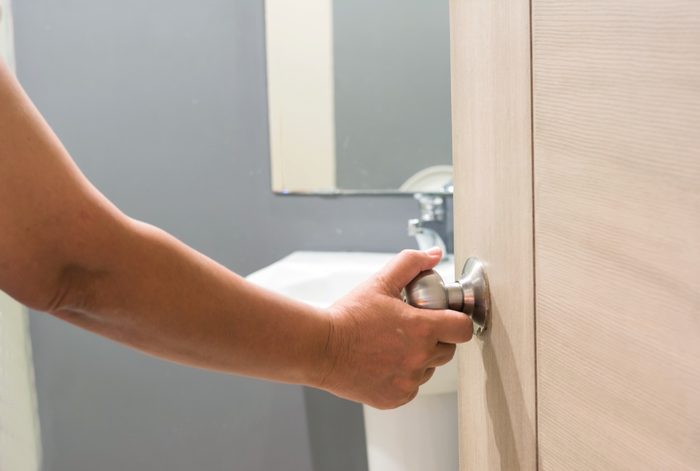
Quarantine constipation
If you’re like many people, you’ve spent the last few months getting the hang of working or taking classes at home—or just spending way more time at home than usual. You may be meeting deadlines, sharing thoughts, and socializing on Zoom calls, but that’s not to say all is well. You may be having more tummy troubles, including constipation, since you started staying at home due to the coronavirus pandemic and shelter-in-place orders.
Constipation affects at least 15 to 30 percent of Canadians, according to the Canadian Society of Intestinal Research. And now, “with most of us spending significantly more time at home, it’s no surprise that ‘quarantine constipation’ has become so common,” says New York-based registered dietitian and health expert Joy Bauer, author of several books, including Joy Bauer’s Superfood!: 150 Recipes for Eternal Youth
Constipation occurs when your stool moves too slowly through your digestive tract. When this happens, too much water is absorbed from your stool, and it becomes hard, dry, and difficult to pass, and you have fewer bowel movements.
There’s no one-size-fits-all definition for constipation. Although many people think you should have a bowel movement daily, you can actually poop anywhere from three times a day to three times a week and it would still be considered normal. It’s more about what’s normal or abnormal for you. The National Institute of Diabetes and Digestive and Kidney Diseases defines constipation as having fewer than three bowel movements a week and passing stools that are hard, dry, or lumpy and being left with the feeling that not all the stool has passed.
There are several lifestyle and medical factors—like a lack of exercise, dehydration, medications, and health conditions—that can increase the risk of constipation.

Why you can’t go
If you are in quarantine, your daily routine has probably been turned upside down and inside out. Now that you’re spending way more time at home than normal, a lot has changed, and that could affect how your gastrointestinal tract is working too. “We don’t move as much and may not be getting enough fibre or water,” says William J. Bulsiewicz, MD, a gastroenterologist in Mount Pleasant, South Carolina and author of the forthcoming book Fiber Fueled. Factor in stress and it’s a recipe for constipation and other gastrointestinal problems, Dr. Bulsiewicz says.
“Stress is completely intertwined with the function of our guts because we produce stress hormones from the brain that will affect the motility and function of intestines,” he says. This means that stress alters our ability to pass stool. “For some people, stress manifests as constipation, but for others, it manifests as diarrhea, cramping, or pain.”
All the worry and concern about money, Covid-19, and the uncertainty of the future can tie your stomach up in knots, but it also drives not-so-gut-friendly choices, Dr. Bulsiewicz explains. (You may want to try these tips from wellness expert on how to manage coronavirus-related stress.) “When we are under stress, we tend to eat more junk food and drink more alcohol,” he adds. In fact, one survey by Fishbowl, a corporate social app, found that 42 percent of nearly 13,000 workers were drinking while working from home.
So, how do you find constipation relief while spending a lot of time at home? Our health experts offer a few tips that will help you get rid of constipation.

Get up and move
If you want constipation relief, you have to get up and move. If you don’t move, your bowels don’t move, says Elena A. Ivanina, DO, a gastroenterologist at Lenox Hill Hospital in New York City. “If you were previously commuting to work, climbing stairs to get to your desk, and using the gym on the way home, then all of those exercise opportunities are lost.”
Regular exercise promotes normal muscle contractions in the bowel wall, Dr. Ivanina says. “Also, the abdominal wall muscles, pelvic floor muscles, and diaphragm all play a crucial role in bowel movements, so if these muscles are weak then it will be more difficult to have a successful evacuation.”
There is a solution if you live in a place where you can safely move around outside your home, Bauer adds. You can consider going for a walk or jog as long as you practise social distancing. “You can even work out at home; there are so many free online workouts to take advantage of, ranging from pilates to HIIT to weightlifting,” she says.

Up your water intake
Stool can become dry and hard with dehydration which makes it more difficult to pass, Dr. Ivanina says. How much water do you need each day? Try this tip from Bauer: “Divide your weight in half; that’s about how many ounces of fluids you should aim for daily” she says. “If you weigh 160, you need 80 ounces or 10 (8-ounce) glasses each day.”
If you don’t feel like calculating a specific number, many experts recommend that you just stay in tune with your body, recognize when you’re thirsty, and then consume liquids. (Keep in mind that it’s possible to drink too much water too.)
If water is too boring, toss cucumber, lemon, orange, strawberries, or mint into your water for extra flavour. Also, “if you’re experiencing constipation, avoid alcohol and high quantities of caffeinated drinks—these are diuretics and increase water excretion from the body,” Bauer stresses.

Fill up on fibre
In April 2020, the International Food Information Council released a survey that looked at eating and food shopping patterns during the coronavirus pandemic. A total of 27 percent of survey respondents said that they’ve been snacking more, and 15 percent said they’re eating more or more often than usual. When it comes to constipation, the type of food you eat matters. For healthy bowel movements and constipation relief, you should make sure to get enough fibre in your diet.
Men should aim for about 38 grams of fibre a day, and women about 25 grams, according to the National Institutes of Health. But many people may find themselves coming up way short of this goal. Most people get only 14 grams of fibre each day.
Fibre adds bulk to stools making them easier to pass, Dr. Bulsiewicz says. Fruits and veggies are great sources of fibre, but in the time of coronavirus, it may be difficult to get fresh fruits and vegetables, and access may also be limited due to store closings and stay-at-home orders. Luckily, fruits and vegetables aren’t the only sources of fibre. “There are high-fibre foods in your pantry, too, such as beans and whole grains,” Dr. Bulsiewicz adds. Do your best to eat an assortment of fruits and vegetables, with an emphasis on insoluble fibre, Bauer suggests. “This type of fibre doesn’t dissolve in water and makes your stool softer and easier to pass.”
Foods with a lot of insoluble fibre help constipation by bulking up stools and speeding up bowel movements. Good sources of insoluble fibre are vegetables like carrots and celery, whole grains, and bran.
The other main type of fibre is soluble fibre, which dissolves in water and forms a gel-like substance. Soluble fibre helps lower cholesterol and control blood sugar, and is found in foods like oats, peas, beans, apples, and citrus fruit. (Many fruits, veggies, and grains contain both types of fibre.)
The advice to eat more fibre holds true even if working-from-home is causing diarrhea, Dr. Bulsiewicz adds. Soluble fibre can absorb excess fluid in stool and slow down digestion, which can help reduce diarrhea symptoms.
Meat, dairy, sugar, and refined or processed foods (like white rice or white bread), have little or no fibre. In fact, limiting certain foods can also help prevent constipation.

Healthier gut, healthier immune system
Your gut is critical to your immune system, according to Dr. Bulsiewicz. “Trying to make your gut healthier is also helping to build up your immune system,” he says. Your gut contains billions of microorganisms known as the microbiome. The microbiome helps regulate the immune system, digest food, and protect against disease-causing bacteria. “Diets rich in fibre such as fruits, vegetables, whole grains, and beans tend to promote healthy gut microbiome,” says Dr. Bulsiewicz.

Focus on self-care
During stressful times, your body can release hormones that slow digestion and intestinal movements, in turn leading to constipation, Bauer says. For constipation relief, “try to limit your social media and news consumption,” she says.
Also, try to incorporate yoga, meditation, journaling, and these other self-care activities into your daily routine.

Know when to try over-the-counter constipation remedies
If you notice there is a mild gradual slowing down or hardening of your bowel movements, it’s OK to try some over-the-counter fibre supplements like Metamucil, which contains psyllium husk, or Benefiber, which contains wheat dextrin. These types of soluble fibre help make stools softer, bulkier, and easier to pass.
You could also consider laxatives, or stool softeners, says Dr. Ivanina. “If it isn’t relieved in a few days or is more abrupt or accompanied by abdominal pain or blood in stool, discuss it with your gastroenterologist right away.” However, habitual laxative use can lead to dependence, meaning that if you use them too often or incorrectly you may be constipated if you don’t take them or it could worsen the problem. Therefore you should always use over-the-counter constipation remedies as directed and don’t take them more often than recommended. Or, try these trusted natural cures for quick constipation relief.

Don’t ignore the urge to go
Also make sure to stay in tune with your body, and go to the bathroom when the need arises. Ignoring that “I gotta go” feeling is not a good idea, Dr. Ivanina says.
“It is extremely important to take advantage of your natural cues to have a bowel movement,” she says. “Ignoring the urge can lead to significant chronic constipation and pelvic floor dysfunction.”

Know when to call your doctor
Tweaking your diet and moving more can troubleshoot many causes of constipation and get you back on track, says Dr. Bulsiewicz. However, if you have additional symptoms or unusual ones, call your doctor.
“If you see blood in your stool, are becoming short of breath with exertion, feeling weak, losing weight unintentionally, or if your symptoms are severe and intense, get evaluated by a doctor,” he says, adding that many gastroenterologists are seeing patients via telemedicine.
Next, learn which Canadian telehealth services are available to you during quarantine.
